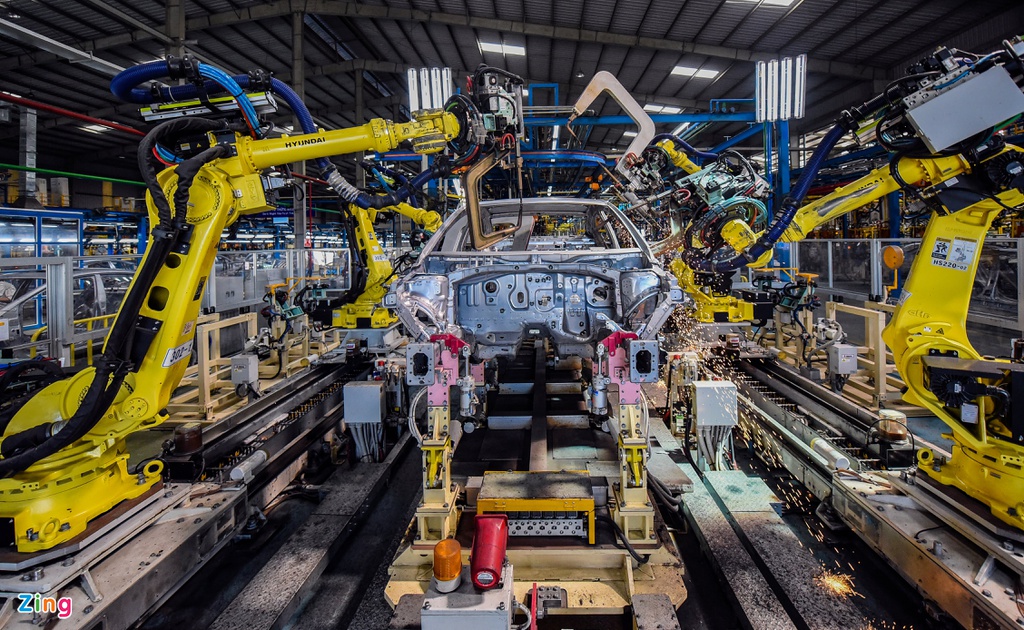 |
|
Experts believe that Vietnam must improve the level of science and technology in order to participate in the global value chain. Photo: Zing.
|
The 3rd Vietnam Development and Reform Forum 2020, entitled “Vietnam: Actions to Recover Growth towards Inclusiveness and Sustainability” was organized by the Ministry of Planning and Investment on September 29. This year, the event focuses on the topic recovering growth after the Covid-19 epidemic, as well as how Vietnam can develop rapidly and stably in the following years.
The topic attracted many domestic and foreign speakers for active discussion. Some argued that Vietnam has no other way than participating further in the global value chain. To do that, it is necessary to raise the level, production capacity, and to make sophisticated and complex products.
"Don't miss a crisis"
In his remarks at the event, Minister of Investment and Planning Nguyen Chi Dung said despite the negative economic impact of COVID-19, Vietnam’s GDP grew 2 percent in the first half of this year and FDI inflows into the country are bouncing back after being stagnant in the first few months of the year. Vietnam was the 12th strongest financially out of 66 emerging economies following the devastation caused by the pandemic, he added.
Dung said that though achieving positive growth in the context of the Covid-19 epidemic, Vietnam still faces significant difficulties and challenges in the coming time. The country is still facing the inherent limitations and weaknesses of a developing economy with low middle income, growth depending on capital, cheap labor and foreign investment sector.
In the short term, it is necessary to quickly restore economic growth, ensure social security, make effective use of development opportunities that have emerged since the Covid-19 pandemic.
Therefore, in the medium and long term, overcome the middle income trap, narrow the development gap with other countries, address environmental challenges, build an independent and autonomous economy ... are the major development tasks for Vietnam.
Victoria Kwakwa, Vice President for East Asia and the Pacific of the World Bank, in her online remarks, mentioned the saying "should not waste a crisis" to suggest opportunities that Vietnam can take advantage of after the epidemic.
She said the current trend globally is to accelerate the application of new technology, diversify supply chains, and accelerate reforms. At the same time, there is a change in behavior, applying automation and digital technology more globally ...
Ms. Kwakwa said that diversifying the supply chain and forming new economic alliances creates opportunities for countries like Vietnam. In particular, Vietnam is a country with an increasingly improved business environment, an attractive destination for investors.
Therefore, the continuation of extensive integration, taking advantage of FDI, and promoting trade are the recommendations that she made for Vietnam.
However, to take advantage of the opportunity, Ms. Kwakwa said that Vietnam needs to accelerate its participation in the global value chain. Currently, the level of participation of Vietnam is very low in the region. It is estimated that in the value chain, Vietnam generates $20.4 billion and ranks 55th in the world. This level is less than a quarter of the ASEAN country like the Philippines, which reached more than $80 billion, ranking 34th in the world.
With its outstanding achievements over the past three decades, Vietnam is a development success story and continues to perform well even in the pandemic on a range of indicators, including trade, growth and human capital, she said.
She also emphasized that Vietnam is still very modest in participating in the delicate steps. Even the development of the manufacturing and processing industry is still limited, not to mention the delicate process. To move up the ladder of the global value chain requires advanced services, developed manufacturing and processing industries, and the participation in sophisticated processes.
According to calculations, an increase of 1% in the participation in the global value chain will increase per capita income by more than 1%, 2 times higher than the value of traditional trade. On the other hand, this will help Vietnam improve labor productivity, generate high income, and overcome the middle income trap.
Doing sophisticated steps, promoting the processing and manufacturing industry will help Vietnam's GDP increase rapidly, Ms. Kwakwa said.
The government needs to review the strategy for science, technology, innovation, to apply and widely disseminate science and technology. In the long term, it is necessary to develop R&D skills and capabilities, reaching the highest limit of productivity.
Agreeing with this, Mr. Jacques Morisset, chief economist of the World Bank in Vietnam, said that Vietnam must focus on training to have more skilled workers. When investing in Vietnam, foreign businesses all think that the skills of workers need to be enhanced to satisfy more complex jobs.
To do that Vietnam must promote post-highschool education and update new technology in the world because at present many Vietnamese businesses are lagging behind in innovation.
Meanwhile, Jonathan Pincus, UNDP's international senior advisor, said that Vietnam will face many challenges when transitioning from a labor-abundant economy specializing in using cheap labor to an economy with advanced technology. However, advances in technology and automation may help Vietnam close the gap faster.
He said that increasing depth in industrial production requires the creation of incentives for domestic firms to invest in new technologies and skills. At this time, the Government must play an active role, must think creatively to create tools to promote investment.
To protect its development gains, Vietnam must be well prepared for strong recovery and make most of the new emerging opportunities, according to Dr. Vu Thanh Tu Anh, Senior Lecture at HCM Ciy-based Fulbright School of Public Policy and Management.
Anh pointed out the fact that despite being one of the most open economies in the world, Vietnam’s participation in global and regional value chains remains limited. Vietnam’s level of participation in global supply chains remains well below its ASEAN peers, such as Singapore, Thailand, Indonesia, Malaysia, and the Philippines, he said, adding that the level of Vietnam’s sophistication in participation remains low, particularly in manufacturing and the country needs to move up to improve productivity.
Anh cited a WB report as saying that a 1-percent increase in global value chain participation boosts per capita income levels by more than 1 percent – about twice as much as conventional trade, so strengthening global value chain participation will be important for accelerating Vietnam’s productivity and growth.
He suggested that in the short-term, the diversification of multinational corporations depends on the recovery prospects of alternative production bases. “In the medium-term, being well-prepared for the ‘new normal’ of global value chains is important,” he said. “Supply chains cannot be established overnight, and companies still have to overcome the expensive and time-consuming process of relocation."
For that, Vietnam can take measures to enable stronger linkages between FDI and domestic enterprises. In the longer-term, Vietnam needs to narrow the productivity gap and move towards the productivity frontier, he stated.
Le Ha

Right adjustment could help Vietnam back as high-performing economy: McKinsey
COVID-19 has interrupted the country’s journey to become a high-performing economy, but the right structural adjustments could help get it back on track, according to McKinsey & Company, a leading US consultant firm.

Foreign banks confident and committed to Vietnam's economy
International Finance Corporation (IFC) announced on Tuesday they have granted a US$70 million loan to Vietnamese Indo Trans Logistics Corporation (ITL Corp).